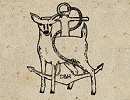Contact Seller
Doe And Hope
Tel07729 213013Please quote Antiques Atlas.

 Oil Painting The Clandon Harriers Hunt
Oil Painting The Clandon Harriers Hunt
 19th Century Oil Painting of an Interior Scene.
19th Century Oil Painting of an Interior Scene.
 High Eldwick by John William Buxton Knight
High Eldwick by John William Buxton Knight
 Flemish Painting Seascape From The 19th Century
Flemish Painting Seascape From The 19th Century
 Religious painting oil on copper Merchants
Religious painting oil on copper Merchants
 Italian Painting Landscape With Goats 17th Century
Italian Painting Landscape With Goats 17th Century
 Small Oil Painting Dated 1922
Small Oil Painting Dated 1922
 James Campbell Noble Oil Painting
James Campbell Noble Oil Painting
 Italian Painting Cherub Games From 17th Century
Italian Painting Cherub Games From 17th Century
 Pair of Antique Victorian Oil Paintings
Pair of Antique Victorian Oil Paintings
 Mid century Swedish painting
Mid century Swedish painting
 Vintage Landscape Painting, English, Framed
Vintage Landscape Painting, English, Framed
Non UK callers :
+44 7729 213013
18thC English Provincial Oil of Windsor Castle

The beautifully time-worn oil on panel, of four conjoined boards, painted provincially, showing Windsor Castle with soldiers and ladies promenading in the foreground with a hound and cannon, and a Union Jack flag raised to the Round Tower, the lodgings of the military knights, the whole surviving in its original gilded moulded frame and hailing from Horton Lodge, Windsor, Berkshire and George III period England.
The panel is formed from four boards in horizontal alignment with butterfly joins and battens securing the joins. There has been movement along all of the joins with old fill and retouching present in the lower two. The paint layer is flaking in some areas with paint loss and areas of vulnerable paint. Some areas of the composition have been strengthened with overpaint. The varnish is yellowed, uneven and dull with surface dirt and insect droppings across the surface. The gilding on the frame is very worn and abraded in many areas. Please refer to the photographs for a full visual reference.
Horton Lodge is a grade II listed eighteenth country house with a 19thc extension. The South front has very fine imported early C18 wood door surround of fluted Roman Doric pilasters. It is pleasing this was once part of the estate which is only three and a half miles from the castle itself.
Windsor Castle is a royal residence at Windsor in the English county of Berkshire. It is strongly associated with the English and succeeding British royal family, and embodies almost 1,000 years of architectural history. The original castle was built in the 11th century after the Norman invasion of England by William the Conqueror. Both the soldiers uniform and the ladies head attire is both of the mid to late eighteenth century period.
George III disliked Hampton Court, and was attracted by the park at Windsor Castle. George wanted to move into the Ranger's House by the castle, but his brother, Henry was already living in it and refused to move out. Instead, George had to move into the Upper Lodge, later called the Queen's Lodge, and started the long process of renovating the castle and the surrounding parks. George's architectural taste shifted over the years. As a young man, he favoured Classical, in particular Palladian styles, but the king came to favour a more Gothic style, both as a consequence of the Palladian style becoming overused and poorly implemented, and because the Gothic form had come to be seen as a more honest, national style of English design in the light of the French revolution Working with the architect James Wyatt, George attempted to "transform the exterior of the buildings in the Upper Ward into a Gothic palace, while retaining the character of the Hugh May state rooms". The outside of the building was restyled with Gothic features, including new battlements and turrets. Inside, conservation work was undertaken, and several new rooms constructed, including a new Gothic staircase to replace May's 17th-century version, complete with the Grand Vestibule ceiling above it. New paintings were purchased for the castle, and collections from other royal palaces moved there by the king. The cost of the work came to over £150,000 (over £120 million in todays terms). The king undertook extensive work in the castle's Great Park as well, laying out the new Norfolk and Flemish farms, creating two dairies and restoring Virginia Water Lake, and its grotto and follies.
At the end of this period Windsor Castle became a place of royal confinement. In 1788 the king first became ill during a dinner at Windsor Castle diagnosed as suffering from madness, he was removed for a period to the White House at Kew, where he temporarily recovered. After relapses in 1801 and 1804, his condition became enduring from 1810 onwards and he was confined in the State Apartments of Windsor Castle, with building work on the castle ceasing the following year.
One rarely sees provincial representations of this English gem and this painting is of good size and ever so wonderfully evocative.
SellerDoe And Hope
View all stock from
Doe And Hope

 Private dealer, By appointment only
Private dealer, By appointment only
The Onion Barn, Shoe Cottage,
15 High Street, Blunham,
Bedfordshire, MK44 3NL.
MK44 3NL
Tel : 07729 213013
Non UK callers : +44 7729 213013
Get directions to Doe And Hope
The panel is formed from four boards in horizontal alignment with butterfly joins and battens securing the joins. There has been movement along all of the joins with old fill and retouching present in the lower two. The paint layer is flaking in some areas with paint loss and areas of vulnerable paint. Some areas of the composition have been strengthened with overpaint. The varnish is yellowed, uneven and dull with surface dirt and insect droppings across the surface. The gilding on the frame is very worn and abraded in many areas. Please refer to the photographs for a full visual reference.
Horton Lodge is a grade II listed eighteenth country house with a 19thc extension. The South front has very fine imported early C18 wood door surround of fluted Roman Doric pilasters. It is pleasing this was once part of the estate which is only three and a half miles from the castle itself.
Windsor Castle is a royal residence at Windsor in the English county of Berkshire. It is strongly associated with the English and succeeding British royal family, and embodies almost 1,000 years of architectural history. The original castle was built in the 11th century after the Norman invasion of England by William the Conqueror. Both the soldiers uniform and the ladies head attire is both of the mid to late eighteenth century period.
George III disliked Hampton Court, and was attracted by the park at Windsor Castle. George wanted to move into the Ranger's House by the castle, but his brother, Henry was already living in it and refused to move out. Instead, George had to move into the Upper Lodge, later called the Queen's Lodge, and started the long process of renovating the castle and the surrounding parks. George's architectural taste shifted over the years. As a young man, he favoured Classical, in particular Palladian styles, but the king came to favour a more Gothic style, both as a consequence of the Palladian style becoming overused and poorly implemented, and because the Gothic form had come to be seen as a more honest, national style of English design in the light of the French revolution Working with the architect James Wyatt, George attempted to "transform the exterior of the buildings in the Upper Ward into a Gothic palace, while retaining the character of the Hugh May state rooms". The outside of the building was restyled with Gothic features, including new battlements and turrets. Inside, conservation work was undertaken, and several new rooms constructed, including a new Gothic staircase to replace May's 17th-century version, complete with the Grand Vestibule ceiling above it. New paintings were purchased for the castle, and collections from other royal palaces moved there by the king. The cost of the work came to over £150,000 (over £120 million in todays terms). The king undertook extensive work in the castle's Great Park as well, laying out the new Norfolk and Flemish farms, creating two dairies and restoring Virginia Water Lake, and its grotto and follies.
At the end of this period Windsor Castle became a place of royal confinement. In 1788 the king first became ill during a dinner at Windsor Castle diagnosed as suffering from madness, he was removed for a period to the White House at Kew, where he temporarily recovered. After relapses in 1801 and 1804, his condition became enduring from 1810 onwards and he was confined in the State Apartments of Windsor Castle, with building work on the castle ceasing the following year.
One rarely sees provincial representations of this English gem and this painting is of good size and ever so wonderfully evocative.
Price
Arrange a final price and delivery details directly with the dealer
Click here to message the seller The price has been listed in British Pounds.
The price has been listed in British Pounds.
Conversion rates as of 28/NOV/2024. Euro & Dollar prices will vary and should only be used as a guide.
Always confirm final price with dealer. Free UK Shipping.
Category Antique Pictures / Engravings / Art
> Antique Oil Paintings
Date c.1770
George III Antiques Material Oil Painting on Panel
Origin English
Item code as155a2152 / 2293
Status For Sale
£1650.00 
$2092.53
€1983.14

$2092.53

€1983.14

Looking to Buy?
Payment with PayPal is availableArrange a final price and delivery details directly with the dealer
Click here to message the seller

Conversion rates as of 28/NOV/2024. Euro & Dollar prices will vary and should only be used as a guide.
Always confirm final price with dealer. Free UK Shipping.
View all stock from
Doe And Hope

 Private dealer, By appointment only
Private dealer, By appointment onlyThe Onion Barn, Shoe Cottage,
15 High Street, Blunham,
Bedfordshire, MK44 3NL.
MK44 3NL
Tel : 07729 213013
Non UK callers : +44 7729 213013
Get directions to Doe And Hope
You may also be interested in
 Oil Painting The Clandon Harriers Hunt
Oil Painting The Clandon Harriers Hunt
 19th Century Oil Painting of an Interior Scene.
19th Century Oil Painting of an Interior Scene.
 High Eldwick by John William Buxton Knight
High Eldwick by John William Buxton Knight
 Flemish Painting Seascape From The 19th Century
Flemish Painting Seascape From The 19th Century
 Religious painting oil on copper Merchants
Religious painting oil on copper Merchants
 Italian Painting Landscape With Goats 17th Century
Italian Painting Landscape With Goats 17th Century
 Small Oil Painting Dated 1922
Small Oil Painting Dated 1922
 James Campbell Noble Oil Painting
James Campbell Noble Oil Painting
 Italian Painting Cherub Games From 17th Century
Italian Painting Cherub Games From 17th Century
 Pair of Antique Victorian Oil Paintings
Pair of Antique Victorian Oil Paintings
 Mid century Swedish painting
Mid century Swedish painting
 Vintage Landscape Painting, English, Framed
Vintage Landscape Painting, English, Framed








